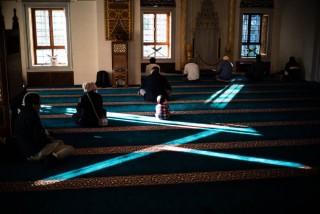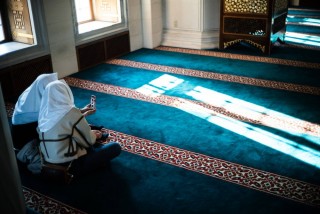Loading
Search
▼ Your Ramadan Experience May Take On New Forms When Living In Japan
- Category:Other
Ask Cendikia Luthfita what she recalls about Ramadan back home in Indonesia and she’s quick to talk about the sounds: the shuffle of a crowd making its way to the mosque at dawn, calls to prayer over neighborhood speakers, the din of street vendors selling meals at sundown so people can break their fasts.
This year will mark the sixth time the 28-year-old doctoral student is celebrating the Islamic holy month in Japan, though here most holiday nights are spent with store-bought meals in her quiet apartment.
Among the challenges that come with moving to a new country, a feeling of isolation during Ramadan is one Cendikia didn’t see coming.
“In Indonesia, you can really feel the atmosphere of Ramadan,” she says. “You can feel the whole neighborhood becoming more religious and high-spirited. It’s very different in Japan, it feels like any other day.”
This year’s Ramadan began on March 23 and is expected to last until April 20. Throughout the month, Muslims who are participating will refrain from eating and drinking for as long as the sun is up.
The holiday period concludes with Eid al-Fitr, a two-day feast that’s enjoyed with extended family and is filled with as much food as gratitude.
In Indonesia, Ramadan is as much of an opportunity for community bonding as it is a religious practice.
Iftar, the meals people eat to break their fasts, are a common excuse to hold potlucks and get-togethers; mosques are almost always packed for tarawih, a special night prayer held only during the fasting month.
Naturally, the festivities are much smaller than in non-Muslim countries, which can lead to feelings of loneliness among the affected Islamic population. Also adding to this disconnect, Cendikia recalls the difficulty of having to fast among her nonreligious peers.
“I had to explain to my friends that this is part of my religious belief — that it’s not something torturous, something I have gotten used to doing,” she says.
Jeihan Beutari Chalil, a fourth-year undergraduate student at Ritsumeikan Asia Pacific University in Beppu, Oita Prefecture, had an easier time explaining her fasting practices to the manager and coworkers at her part-time restaurant job.
“My manager gave me extra break time in the evening so I could break my fast between work hours,” the 21-year-old says, adding that she was grateful her co-workers were very supportive of her religious needs. They’d even go a step further and make sure she wasn’t working too hard during her fast.
Making the most of Eid al-Fitr
While Eid al-Fitr is a national holiday in Indonesia, it is just another day in Japan. Jeihan attends classes and her part-time job between Eid prayers and feasts.Like Cendikia, she also felt the lack of a celebratory atmosphere in Beppu, so she learned to make the most of Ramadan and Eid al-Fitr by throwing dinner parties with friends.
“We usually make small celebrations at a friend’s apartment,” she says. “It’s a potluck, so everyone will bring their own food.” Jeihan adds that her non-Muslim friends also join and bring dishes to celebrate.
To satisfy her cravings for traditional Indonesian food, Jeihan and her friends cook rendang (beef stew) and lontong (rice cake wrapped in banana leaf) for their Eid al-Fitr potlucks.
The local wholesale supermarket in Beppu sells instant seasoning packets, but Jeihan still has to find alternatives for any rare ingredients.
“We didn’t have any banana leaves to wrap the lontong with,” she says, giving an example from a past celebration. “So we used food-grade plastic as a replacement.”
For Drianda, 39, an associate professor and researcher at Waseda University, the month of fasting is a great opportunity for her children to reconnect with their Indonesian and Muslim roots.
Drianda arrived in Japan in 2006 and has only ever gone back home for research purposes. Her children, now 10 and 15, are more familiar with the Japanese lifestyle, language and environment.
When Ramadan approaches, however, they’re still excited to fast and celebrate the Islamic holiday with their parents. Drianda believes her children’s exposure to the Malaysian cartoon “Upin & Ipin”— which depicts the lives of young children in an Islamic rural village — helped drive their interest in Ramadan and Islamic culture.
Drianda prepares different types of sahur (meals consumed at dawn before fasting) and iftar meals during the weekends: Indonesian-style for her and her husband and a fusion of Indonesian-Japanese style for her children. At the end of the month, the family prays at Ja’me Masjid in Yokohama or at Tokyo Camii in Shibuya Ward, both of which are mosques.
Still, Drianda’s work responsibilities are not always accommodating to her religious obligations, so she needs to compromise when duty calls. “Deadlines do not care for fasting or Eid al-Fitr. It’s not part of (Japanese) culture, so it is up to us to adapt.”
Securing a support system
The contrast between the festive Ramadan celebrations in Indonesia and the do-it-yourself approach in Japan can feel jarring. Cendikia felt particularly isolated during her first fasting month in Japan. Seeing her family and friends in Indonesia send images of food and gatherings made her homesick.“To me, Indonesian people are very warm-hearted,” she says. “(The lack of) warmth was what made me break down during my first year of fasting in Japan.”
Clinical psychologist Felicia Nainggolan says homesickness and feelings of isolation are a normal reaction to moving abroad. The Java native says she encounters many such cases through her work at TELL, a service focusing on mental health that caters to various foreign communities.
Her advice is to reset expectations about celebrating the holidays in Japan, acknowledge your new environment, and adapt to it by creating different routines. Search out members of the diaspora as they’ll often host open-houses and iftar dinners.
Such events can be a great way to cope with homesickness as they provide a safe space for transplanted Indonesians to speak in their mother tongue, reconnect with their culture and engage in communal religious practices.
Nainggolan recommends maintaining communication and engaging in activities with peers — whether online or offline — as a way to manage loneliness.
“Oftentimes, feeling homesick triggers the need to pull back from everyone,” she says. “It’s best to reach out and stay in touch (with friends and family). If feelings of isolation and homesickness still persist, consider seeking professional help.”
During her first Ramadan in Japan, Cendikia says she made the decision to seek professional help to manage her sadness. Since then, she has adopted new ways of coping with any feelings of homesickness, including seeking out friendships with other Indonesians who live in Japan.
“Sometimes, just hearing the Indonesian language is enough to make me happy,” she says.
A time for gratitude, wherever you are in Japan
The Hokkaido Islamic Society is an active international community that provides support ranging from marriage ceremonies and burial assistance to general mental health support for Muslims residing in Hokkaido Prefecture.
Throughout the month of Ramadan, the society hosts communal sahur and iftar meals at the Sapporo Mosque. Representatives from the various diaspora — from Indonesia, Saudi Arabia, Bangladesh and more — take turns preparing dishes. Meals are free for Muslims visiting the mosque.
“In Indonesia, Ramadan is not only about fasting, there are a lot of things that make the environment merry,” says Mahmud Aditya Rifqi, 34, who attends Hokkaido University in Sapporo, away from his wife and children.
“It’s not like that (in Hokkaido), so these communities, especially those from the mosque, help in relieving any loneliness.”
On the other side of Japan, Nadira Avisina and her friends like to celebrate Ramadan and Eid al-Fitr with picnic-style potlucks using the green spaces along the Kamo River in Kyoto.
For prayers, she likes to visit the Kyoto International Community House, which provides hall space for cross-cultural interactions. Eid al-Fitr prayers are usually held there with meals and religious lectures in both Japanese and English.
- March 27, 2023
- Comment (0)
- Trackback(0)



